Hi all, there is very much of a “what will the new academic year hold” feel about this week. Will there be another national lockdown? Is the rise in virus cases a second wave or a small bounce? What will university students do when they are not learning or socialising online? In the “find someone to blame for everything” environment that is so prevalent (and so disheartening), students are the latest group to be targeted for vilification. But there is other news too…
Research news
The Minister speaks
Science Minister Amanda Solloway spoke this week to promote researcher wellbeing and push for changes in the sharing and evaluation of research.
The Minister spoke of the barriers to sticking with a research career – little chance of secure permanent employment, a hamster wheel of short-term funding alongside publishing in the ‘right’ journals, alongside a focus on bullying and harassment. The Minister said:
- it was an enormous shock… to learn that nearly two-thirds of researchers have witnessed bullying or harassment at work, and almost half have experienced it themselves…. As government, it is our duty not to condone the behaviour of bullies, no matter how talented they may be as individuals.
- Institutions with widespread bullying and harassment problems should not benefit from the taxpayer’s support.
Career Path
- we should make sure that we create real longevity in careers. Employers should provide clear career paths, and the stable employment contracts to match… for those that wish to pursue a career in R&D, we should provide clear routes to progression, including routes between academia and other places, and between technical and research roles
- Having a casualised research workforce where the vast majority of people can’t develop a proper career is no way to build our status as a science superpower.
- Because research is inherently creative – it’s about finding out new things, taking risks and venturing into the unknown. Nobody should live in fear that, if they don’t play exactly the same game as everyone else, according to the same narrow set of rules, they’ll lose their jobs.
Funding System
- we must do whatever we can to put diversity at the heart of everything we do… promoting diversity should never simply be reduced to a tick-box exercise – just one more thing you have to demonstrate to win funding.
- We must look seriously at whether the system of short-term grants for projects is really working… Or whether it’s instead promoting a monoculture of bureaucracy and risk aversion.
- This means supporting sustainable and well-funded teams, units and institutions. With support for everyone involved in our R&D vision – from top scientists to postdocs to PhD students and doctoral apprentices, from technicians to professional support staff. From leaders, managers, governors, and people working in our funding agencies. To people interested in science, engaging with research, or considering a future in research for themselves or their children. Our R&D People and Culture Strategy should support the whole system – backing everyone to do their best.
- And when we do provide funding, we should do it properly and sustainably.
Evaluation & Access to Research
- it’s so baffling to me that scientists and researchers seem to evaluate each other in such strange ways – by obsessing over spurious metrics or narrow indicators of prestige…the pressure you feel from things like grant income targets or the impending Research Excellence Framework (REF)… I of course recognise that the ‘publish or perish’ culture in research is not unique to the UK
- So I have today written to science ministers across the world, to invite them to join me in looking closely at this dependence on publications and to find out what we can collectively do about it….an outdated [reliance on]… closed-access journals which locks scientific discoveries away, tragically curtailing their usefulness. An important part of the solution must be to make research more openly available.
- So let me restate this government’s commitment to full and immediate open access to all publicly funded research. And let me give my full backing to UKRI for the work they are doing to develop a new open access policy, working alongside international partners.
- We should embrace, and encourage, new ways to share research – the exciting, diverse ways to communicate research… We should value datasets, code and open methods, just as much as we value books, journals and conferences… let’s celebrate the exhibition, the performance, the roadshow, the website and the wiki. The television programme, the community engagements, the patient involvement and the citizen science programme.
UKRI
New UKRI Chief Executive Ottoline Leyser presents her Viewpoint blog: We must reshape the system so it genuinely values and supports difference. It begins:
- The data are clear. There are pervasive problems with equality, diversity and inclusion in research and innovation, which impoverish the system, stifle creativity and deny opportunity to people who have so much to contribute.
- It is equally clear that there is huge appetite for change. We have reached a turning point in the debate…
Research Parliamentary Questions
- When and how regularly the Government plans to publish diversity statistics for the UK’s research sector. (The next harmonised diversity data release is due early 2021.)
- UKRI also committed to expanding their data collection and analysis capabilities including Innovate UK grants. And that they would publish other diversity data more regularly, e.g. the detailed ethnicity analysis of grant applications.
- Whether BEIS plan to reform the REF to reduce admin, incentive collaboration, and focus on assessing groupings and teams. Answer – the Government will examine the mechanisms and agree a set of reforms – it is worth reading the full response
- What assessment they have made of the reduction in research funding available to universities as a result of reduced charitable giving during the COVID-19 pandemic; and what plans they have to increase funding to compensate for any such reduction. (Answer references the SURE fund.)
The Lords Science & Technology Committee held a session debate on the report into Science research funding in Universities late last week. Excerpts:
- The Committee registered surprise that the Augar review did not consider the impact the recommendations would have on universities’ ability to conduct science research—one of the key roles of universities: if Augar recommendations are implemented, it will seriously affect the Government’s ambition to make UK a science superpower … Stagnation in QR funding for over a decade, a decrease in full economic costs to 70% from funders and a shortfall in support funding from government in relation to charities’ research grants leaves universities to have to cross-subsidise costs, mainly from international student fees. Added to these ongoing funding issues, there is now the significant and unknown effect of Covid-19 on university finances and research…The biggest threat to universities from the reduction in funding is a reduction in research talent. (Lord Patel)
- On the Government’s response, Lord Patel noted it was positive but did not go far enough: The Government R & D road map sets out the framework, but now it needs the Government to engage with the university sector to get the details right.
- The issues of a decrease in funding and the long-term impacts this may have on R&D and medical advances were discussed.
- Lord Willetts (Con), argued it would be a mistake to think that we can get anywhere near 2.4% if our research activities are concentrated in a small number of elite universities.
- Lords from across the Chamber agreed that Scientific Research across HE needed to be prioritised.
- Lord Callanan stated that the future global talent visa would help this skilled cohort of individuals to access the UK, empowering them to significantly enhance our knowledge base and make critical contributions to scientific and medical research. And: Research, innovation and knowledge are the drivers of our global competitiveness and a key source of economic advantage. I assure noble Lords that we remain committed to maintaining the UK’s position as a global science superpower, and that we will continue to invest in our universities and in the science and research that will deliver the long-term economic growth and societal benefits.
The Secretary of State speaks
In Tuesday’s Education Committee accountability session Gavin Williamson answered questions on Covid related disruption of school and exams including a focus on grades and the system selected. There was no HE specific content. If you have an interest in the topic but do not wish to view the full session contact Sarah for a summary (ref: Thurs D1502).
International (Visas)
The House of Commons Education Committee has published the letter from the Minister for Future Borders and Immigration on the changes to the points-based student immigration routes. We mentioned this in last week’s update; here is all the detail from the letter:
- The Government welcomes international students and places no limit on their number. This will not change under the points-based system. We are committed to increasing the number of international higher education students in the UK to 600,000 by 2030 and the new Student route will support us in achieving this aim.
- From 5 October, all prospective international students, including those from the EU, coming to study in the UK after the end of the transition period will need to apply to the Student route before coming to UK. To help prepare EU students who will need to apply through the points-based immigration system in order to commence their studies here from January 2021, we have created tailored guidance, which can be found
- The main differences between the new Student route and the previous Tier 4 are outlined below:
- EEA nationals will be incorporated into a global application system. EEA nationals will be required to meet the same requirements to study within the UK as non-EEA nationals and will need to apply under the Student rules;
- There will be a new set of simplified Immigration Rules for the Student and Child Student routes, in line with the recommendations made by the Law Commission;
- Students will be able to apply for permission to come to the UK six months before they plan to travel;
- There are increased switching permissions within the Student route and increased switching between routes within the new points-based immigration system. Students will be able to apply for further permission from within the UK, provided they meet the academic progression requirement and the new course of study commences within 28 days of the expiry of the current leave. This enables clearer pathways for students studying at all levels;
- The eight-year time limit on studying courses at postgraduate level has been removed. There is no longer a limit on the time an individual can spend studying postgraduate courses;
- Those applying for permission to stay in the UK on the Student route will not need to demonstrate funds if they have already been here with valid permission for 12 months or longer at the point they apply;
- Students applying for leave as a Student Union Sabbatical Officer or to study on a recognised Foundation Programme will not be required to prove evidence of maintenance funds, as it is accepted these individuals will be earning an income during the validity of their visas;
- Students at higher education providers with a track record of compliance will not routinely be required to provide evidence of academic qualifications used to obtain the offer of sponsorship;
- Students who have passed relevant qualifications in English language or literature in the UK whilst studying under the age of 18 will be able to meet the English language requirement; and
- EEA and Swiss nationals, and nationals of the USA, Canada, Australia, New Zealand, Japan, Singapore and South Korea, will be exempted from having to apply for an Academic Technology Approval Scheme (ATAS) certificate to study certain sensitive subjects in the UK.
- To recruit international students, educational institutions must have a Home Office approved sponsor licence. Institutions who are already Tier 4 sponsors will automatically become Student sponsors.
- To retain the brightest and the best students to continue to contribute to the UK post-study, we will launch the Graduate route in Summer 2021. This new route will allow those who have completed a degree at a UK higher education provider, with a track record of compliance, to stay in the UK for two years (three years for PhD graduates) and work at any skill level, and to switch into work routes if they find a suitable job.
- There will be new rules on how applicants meet English language and finance requirements in immigration applications. These rules will only apply to the Student and Child Student routes initially, but will in time apply to all immigration routes. Guidance will be published in the near future.
The Commons Public Accounts Committee published a report on Immigration enforcement this week.
International Parliamentary Questions
Graduate work visa: The potential merits of extending the duration of the graduate work visa. Answer – no:
- We believe that 2 years (3 years for PhD graduates) is a fair and generous amount of time to allow international graduates to have unrestricted access to the UK labour market, enabling them to gain valuable work experience and to kick-start their careers. We also believe this will help to ensure that the UK continues to be an attractive destination for international students. We will of course keep the operation of the graduate route under review once it has been implemented.
Recruitment: What discussions have been held with the British Council on the number of international students expected to enrol in UK universities during academic years (a) 2020-21, (b) 2021-22, (c) 2022-23; and what support his Department has offered to the British Council to help attract international students for the academic year 2020-21.
The Secret Life of Students
Wonkhe ran a two day event – The Secret Life of Students – this week. Nicola Dandridge (OfS) presented and included some news:
- The admissions review that was launched before lockdown is to remain on pause to allow universities to deliver the 2021 cycle first (and tackle any difficulties that arise). So while it is possible that the government will want a new approach (PQ offer making?), they are not going to try and inflict it on us straight away – especially as there may be challenges next year from delayed exams or further waves of the pandemic.
- Whether the NSS will run during 2021 will be decided shortly. Communication to the sector is expected after the next OfS Board meeting. ICYMI we covered the government’s plans for NSS in last week’s update.
- The anticipated consultation on student outcomes will follow very soon. This will be an important set of changes because it is strongly linked to the government’s agenda on value and quality.
- An OfS and Research England joint funding competition addressing diversity will be announced presently.
Wonkhe’s weekly podcast (The Wonkhe Show) promises to cover the highlights from the two day event. Info on how to subscribe to the podcast is here.
Digital Teaching & Learning
Research Professional report on a Jisc survey (mainly carried out pre-lockdown) in which 23% of students stated their digital teaching and learning was poor quality. 28% also said the university didn’t facilitate access to online systems from any location. Michael Barber, Chair of the OfS, is conducting a review into digital teaching and learning for the OfS before he steps down from the Chair’s role.
- The survey also revealed that only around half of students said they receive guidance on digital skills from their university, which Jisc said showed “the higher education sector must up its game to deliver the high-quality experiences students deserve, and the skills they need to thrive”.
- While 93 per cent of students said they had access to a laptop, Jisc said the fact that many universities had offered laptops or bursaries to students when lockdown began “implies that the devices some students owned did not meet their requirements”.
- Sarah Knight, head of data and digital capability at Jisc, said the pandemic had “has highlighted the urgent need to address digital poverty” among students as more teaching is carried out online.
- “Universities and colleges must do what they can to ensure all students have an equitable experience, whether they’re learning face-to-face, remotely, or through a blended approach,” she added.
You can read more on the OfS Digital Review in this Research Professional article and this is the OfS’ call for evidence.
Returning students – Covid concerns
With a nationwide jump in Covid cases attention continues to focus on students who begin to travel to their universities. Wonkhe have a series of articles discussing the latest:
The time for a nationally coordinated response for higher education to Covid-19 has passed – what matters now is how well organisations collaborate locally. What might need to be in place to make that happen?
With the R number back above 1 in England, what data is useful for responding to C-19 risks?
As the UK cracks down on socialising will a heavy-handed interpretation damage students’ education and community safety?
The government has published its guidance for universities in England on reopening campuses but is it too little, too late?
Slightly off topic but related Wonkhe have a blog asking if league tables are pointless given they will rely on data collected during the pandemic – Has C-19 infected university league tables?
And from Research Professional (RP): several UK universities are launching their own efforts to test their students and staff for Covid-19, rather than relying on the highly criticised national system.
RP also cover the University of Bergen which has shutdown following 230 students contracting Covid.
University Wales have a joint statement setting out the shared responsibility to keep communities safe.
Wonkhe report that: The Department of Health has urged universities to prepare for the NHS Covid-19 app – due to launch on 24 September – by creating and displaying NHS QR posters from a government website. The app will automate checking in to a location, and the notification process where an outbreak has been reported.
Politics Home has an article stating Universities are launching their own C-19 testing regimes because the Government test and trace programme is descending into a shambles.
Some parliamentary questions:
Finally Wonkhe cover the Public Health England blog –
- Student life in the time of Covid-19 advising students that their “household” will consist of housemates or flatmates who share a student home, or if living in university halls “your university will let you know what makes up your household”. Framing all students as people who live in student accommodation, it says that student housing “will be a key part of how you will be able to socialise” and indicates that opportunities to meet new people outside a household and socialise safely at university can still take place under social distancing rules – adding further confusion for universities who are working through the implications of the new “rule of six” for student social activity.
Free Speech Legislation targeted at Students’ Unions
Times Higher have an article stating the Government is considering legislating on free speech within universities with students’ unions under the microscope through extended statutory duties and threatening fines. Excerpts from the article:
- Speaking in the House of Commons last week, Gavin Williamson, the education secretary, said the government was “exploring a range of legislative and non-legislative options” to protect free speech on campuses, following the Conservative manifesto pledge to “strengthen academic freedom and free speech in universities”.
- There have been discussions in the government about teeing up the issue of campus free speech in the further education White Paper, expected this autumn, then introducing legislation subsequently that would extend statutory free speech duties – already imposed on those who run universities – to students’ unions, sources told THE.
- The Department for Education is also believed to be examining the system of block grants directed by universities to students’ unions.
HNCs & HNDs – in partnership with FE only?
EDSK (a thinktank) have published Further Consideration: Creating a new role, purpose and direction for the FE sector. The report focuses on the 16-19, FE and Institute of Technology sector and gets behind the Government’s current passion for FE with the aspiration that vocational and technical routes be of equal prestige as university academic studies. Its sets out a number of recommendations of how this could be delivered in practice. Including that:
- Higher-level technical qualifications should be funded by government if they are publicly endorsed by employers, professional bodies or Institutes of Technology. Each awarding organisation should also be restricted to offering one qualification per level in each subject. (Recommendation 12)
- Aside from the approvals process for technical qualifications, there is a longstanding issue regarding the institutions that are responsible for providing qualifications at Levels 4 and 5. FECs deliver just over half of the qualifications at these levels, with Higher Education Institutions (HEIs) such as universities delivering about a third of them. The list of qualifications available at Levels 4 and 5 is a mixture of academic and vocational courses of different sizes and with different purposes, such as Foundation Degrees, Higher National Certificates and various Awards, Certificates and Diplomas offered by a wide range of AOs that can last anything from a matter of hours up to two years. The problem is that HEIs currently compete with colleges to offer technical qualifications such as HNCs and HNDs, leaving learners and employers uncertain about who to engage with should they wish to pursue a higher technical pathway.
- To reflect this report’s calls for greater collaboration among education providers within each locality, it is counterproductive for HEIs to be able to colonise the higher-level technical education space without any regard for similar provision available at nearby FECs. As discussed throughout this report, the advent of new ‘Technology Colleges’ will put the FE sector in a strong position to drive forward skills development and economic growth in their local areas, but this will only be possible if they become a ‘hub’ for higher technical courses that employers recognise and utilise.
And coordinating provision in a local area quickly moves to not permitting HEI’s to deliver these qualifications independently:
- The provision of Level 4 and 5 technical qualifications should be led in future by Technology Colleges. This means that HE providers such as universities should not be allowed to offer these qualifications unless they deliver them in partnership with local FE institutions. (Recommendation 13)
Of course where there is partnership there is also top slicing as each institution attempts to cover some of the admin and quality assurance costs on top of the actual delivery and associated student services.
Recommendation 15 gives a (perhaps unintentional) nod to Labour and the Liberal Democrats repeated calls for individual learner accounts:
- All learners should be given access to a new ‘lifetime loan limit’ of £75,000, which they can use to engage in education and training at any time throughout their career after the initial funds in their IEB have been used up. This lifetime loan system would cover both tuition and maintenance costs for university, college and apprenticeships.
So if you go to a University which charges higher fees you are looking at a one time hit. Of course, this is the case now for most learners, with only certain courses in key areas (such as STEM) which mean a student can access funding to study a second degree/equivalent level course.
The EDSK report reminds that there will be a white paper published in the autumn expected to address FE and particularly the technical skills agenda modelled on the admired German system.
HE Code of Governance
The Committee of University Chairs has published the Higher Education Code of Governance. It aims to identify the key values and elements that form an effective governance framework. Yet is also recognises that good governance practice is complex and goes beyond the adoption of the Code; that it requires an organisational culture which gives freedom to act; establishes authorities and accountabilities; and at its core fosters relationships based on mutual respect, trust and honesty.
The Code’s objectives are to:
- determine, drive and deliver the institution’s mission and success in a sustainable way (financial, social and environmental)
- protect and promote the collective student interest and the importance of a high-quality student experience
- ensure student outcomes reflect good social, economic and environmental value; and effectively manage opportunities and mitigate risks to protect the reputation of the institution, ensuring financial sustainability and accountability for public funding
- promote and develop a positive culture which supports ethical behaviour and equal, diverse and inclusive practices
- promote excellence in learning, teaching and research, monitoring institutional and governing body performance
- publish accurate and transparent information which is widely accessible
- lead by example, being flexible and adaptable to create a resilient future
- ensure arrangements are in place for meaningful engagement with relevant stakeholders (especially students and staff) locally, regionally, nationally and globally
How lucrative is postgraduate study?
The DfE and IFS have published The earnings return to postgraduate degrees in the UK. It analyses the earnings of postgraduate students by subject and institution type using LEO data and controlling for individual and background differences (including prior attainment). They compared the postgraduates’ earning against a control group who didn’t undertake further study. The study compared earnings by age 35 (to give sufficient time for employment and labour market experience post-qualification).
Page 6 gives interesting facts and figures on who undertakes a postgraduate degree and what they are studying
Here are the key points on earnings:
- For both men and women, masters and PhD graduates earn more on average than those with only an undergraduate degree, while PGCE graduates earn less on average. In particular for men this last gap is large, with PGCE graduates earning around £38,000 on average at age 35 compared to nearly £51,000 for those with only an undergraduate degree. For both genders earnings growth through the thirties is largest among undergraduates and PhD graduates and smallest for PGCE graduates.
- Earnings inequality varies widely across qualification groups, with very few PGCE graduates experiencing very high earnings, but also many fewer experiencing low earnings compared to those who left education after their undergraduate degree. As a result, despite the large differences in mean earnings, median earnings of PGCE graduates are very similar for men, and even somewhat higher for women, than those of undergraduates.
- Once we control for differences between students, the earnings gap between undergraduate and masters and PhD graduates drops significantly: we estimate returns of 2% (women) and -2% (men) for masters and 8% (women) and -9% (men) for PhDs.
- Our estimated returns for postgraduate degree are considerably smaller than previous estimates from the UK, which have been consistently positive. We believe this is because we have much richer data than has previously been available which allows us to much better control for differences between postgraduates and undergraduates.
- PGCEs are a relatively ‘safe’ choice for both women and men: they reduce the chances of not being in employment, as well as earning less than £30k, but decrease the probability of earning more than £40k. We see quite similar patterns for PhD degrees, as well as for masters degrees for women. Perhaps this is because these degrees tend to result in people pursuing specific interests, such as research, where salaries are reasonable, but which are not necessarily the most exceptionally lucrative careers. For men masters degrees do not offer this insurance value.
Page 8 summarises how the returns vary by subject, institution and prior qualification. In short the return varies across subjects (see PhDs in maths and psychology – it’s not what you might expect); the institution means a difference between a negative and positive effect for masters (but its tangled up with subject choice too), prior study remains an effect with better returns when the masters subject diversifies away from the UG choice (except for high pay areas – law, economics, etc).
The report concludes:
Masters
- The most striking finding, perhaps, is that while masters graduates on 55 8 average have higher earnings than graduates without postgraduate qualifications, once we account for differences in attainment and background characteristics we estimate a very low average return for women (1.5%) and even a small negative return for men (-2.3%). This average result masks important variation… Masters degrees in law, economics and business are particularly lucrative.
- For students, the average returns to postgraduate degrees are perhaps less rosy than previously thought. However, more positively, for virtually all students there are some masters options they can do given their undergraduate subject that lead to positive earnings returns.
PhD
- Our returns estimates suggest that PhD degrees boost earnings for women by around 7.5%, but reduce earnings for men by 9% [except for business]. One important point about the returns for PhD degrees is that there is some evidence that the returns continue to grow after age 35, as individuals gain more work experience. This suggests that the outlook might be more positive (especially for men) at later points in the life cycle. More generally, future research should consider the full life-cycle effects of postgraduate degrees.
And on disadvantage:
- We also investigate access to postgraduate study and find that while large raw participation gaps do indeed exist, these are almost entirely explained away by prior attainment. This does not necessarily mean that if prior attainment were to improve amongst students from disadvantaged backgrounds then postgraduate fees would not generate barriers to access; it simply suggests that, currently, gaps in attainment in school and undergraduate degrees seem to be the binding constraint in terms of access to postgraduate courses among students from less well-off backgrounds.
Students as consumers
You may recall the student petition calling for a tuition fee refund due to Covid-19 disruption to their education and university experience. The Government dismissed it, however, it was reopened by the Petitions Committee and ran an inquiry to investigate the impact on students, particularly those from disadvantaged backgrounds and those from ‘hands on’ courses (the Committee’s report here). The Government have now responded to the Committee’s report (as they are required to do).
The Government’s response stated students have rights under consumer law but the exact circumstances in which a student might receive redress are not clear. This is because the question of whether an individual student is entitled to redress will depend in part on the specific contractual arrangements between them and their provider. It will also depend on the student’s individual circumstances, given that the move to online tuition will have been different for students on different courses and at different universities. The result is that each student’s situation is unique, and each case will depend on particular facts…. It is a matter for providers to determine whether a refund is appropriate and, if so, how such refunds should be paid. In other situations, including compensation paid in response to complaints arising from industrial action at universities, this has taken place via direct refund. Any refund is a matter for providers, so the Government is not considering writing off or reducing tuition fee loans.
The Government also refused to coordinate the matter: due to the individualised nature of student contracts and student circumstances, a new centralised system to support students seeking tuition fee refunds is not a preferred option at this time. Any such system would risk depriving institutions of the opportunity for early resolution of complaints with students, in situations where remedies other than refunds would be more helpful or beneficial to a student. Any centralised system would also be unlikely to be able to sufficiently take into account the circumstances an individual student has faced without detailed input from their institution, thereby replicating the first step in the established process for complaints – students in England and Wales first follow their institutional complaints process, and if they are not satisfied with the outcome can take their complaint forward to the OIA.
They also agreed students should be aware of their rights and how to make a complaint and… The Government is working closely with external stakeholders including UUK, NUS, OfS, CMA and OIA to explore existing communications channels and how these could be used to improve students’ understanding of their consumer rights…. More must be done to ensure that students know their rights and can play an active part in holding their provider to account, to ensure that they are receiving the value for money which should be expected of our world-leading universities.
In short, there has been no real change.
Wonkhe report that The Department for Education has set up a working group to consider whether existing guidance on consumer rights can be brought together or added to. They also discuss the Government’s response in this blog.
HEPI – student voting
HEPI has released another report on student voting, from another nuanced angle. This one looks at student voting within the last 4 general elections (2010, 2015, 2017 and 2019) asking Student voters: Did they make a difference? Focussing only on the 25 constituencies where well time students constitute at least 17.5% of the voting electorate. Nick Hillman (HEPI Director) states:
- Our research confirms that student seats lean left, though perhaps to an even greater degree than previously thought. In constituencies in England with lots of students, Labour scored 25 percentage points more, while the Conservatives scored 25 percentage points less. The student vote has proved decisive in seats like Portsmouth South, Leeds North West, Canterbury and Coventry South. Labour also outperform the Conservatives in student seats in Wales and Scotland, though it is the SNP that tends to win in student areas in Scotland.
- Our research highlights some common fallacies. For example, minor parties, such as the Green Party, have not generally done particularly well in student seats. Moreover, the common idea that the voice of students will be louder if they vote at their term-time address rather than their home address is often wrong – as students can sometimes just help stack up even bigger majorities in safe seats. While the Liberal Democrats struggled to maintain their previous performance after entering Government in 2010, they continued to do better in seats with lots of students than in England as a whole until 2019.
Nick also speaks directly to students:
- As the new academic year begins, I urge students who move away to study to keep their options open by making sure they are registered to vote in their place of study as well as at their home address.
…and to and parliamentary candidates:
- I would also urge policymakers not to take the student vote for granted. While students are interested in so-called “student issues”, such as student finance, they are also motivated by other issues, such as climate change, the state of the NHS and the UK’s place in the world.
- We also all need to avoid the simplistic assumption that going to university makes people left-wing, as this idea is increasingly being challenged by academics with hard evidence.
The NUS have responded to the report:
The report confirms many things that NUS have previously asserted including:
- Students have a significant impact in General Elections and should be considered as a key voter group
- Students care about so-called ‘student issues’ such as student finance, but are also motivated by other issues such as climate change, the NHS and the UK’s place in the world
- Whilst student seats lean left, it’s also important to remember that students are not a homogeneous group and students hold a wide range of political beliefs
The report comes at an important time as students prepare to organise around key issues for the 2021 May local elections and national elections in Wales and Scotland.
Social Mobility Commission
The Social Mobility Commission have released The long shadow of deprivation – research carried out by IFS, the UCL Centre into areas with the lowest social mobility. It links educational data and HMRC earnings information to identify young sons from disadvantaged families (entitled to free school meals) who attended state schools. The research tracked them from age 16 to 28. The press release states the results show a postcode lottery for disadvantaged people. In areas with high social mobility, disadvantaged young adults earn twice as much as those with similar backgrounds in areas with low social mobility… . In the “coldest spots” those from disadvantaged backgrounds, entitled to free school meals, have little chance of making a better life for themselves or their children.
- Education, often blamed for social mobility differences, is only part of the answer. In areas with high social mobility, gaps in educational achievement account for almost the entire pay difference between the most and least advantaged sons. On average it accounts for 80% of the difference.
- However, in local authorities where social mobility is low it is much harder to escape deprivation. In such areas, up to 33% of the pay gap between the highest and lowest earners is down to non-education factors, like local labour markets and family background.
- Disadvantaged workers are restricted by factors including limited social networks (fewer internships); inability to move to more prosperous areas; limited or no financial support from family; less resilience to economic turbulence due to previous crisis such as 2008 financial crash and less developed soft skills.
- The [social mobility] commission is now urging regional and community leaders to use the findings to help draw up tailored, sustained, local programmes to boost social mobility, building on the approach in some Opportunity Areas. The commission will also ask the government to extend its current Opportunity Areas programme – which gives support to 12 councils – to include several more authorities identified as the areas with the most entrenched disadvantage.
Steven Cooper, interim co-chair of the commission said:
- These findings are very challenging. They tell a story of deep unfairness, determined by where you grow up. It is not a story of north versus south or urban versus rural; this is a story of local areas side by side with vastly different outcomes for the disadvantaged sons growing up there.
PQs
A financial focus runs across our remaining parliamentary questions this week:
Inquiries and Consultations
Click here to view the updated inquiries and consultation tracker. Email us on policy@bournemouth.ac.uk if you’d like to contribute to any of the current consultations.
Other news
Unpaid internships: There are currently two Private Members’ Bills before Parliament on unpaid work experience/internships (prohibiting them). You can read the summary of the debate from the Commons Bill here.
Online events: The Parliamentary and Scientific Committee are running a series of online events on specialist topics (free to BU staff) see this link for the areas covered.
Degree Apprenticeships: Wonkhe report on an FE Week article stating that the Office for Students is to be stripped of its role (held since June 2019) in overseeing degree level apprenticeships, with Ofsted taking on the responsibility alongside its existing role in inspecting apprenticeships up to level 5. This was a recommendation made by the Augar report.
Policy revamp: Labour have begun revising their higher education policy. Research Professional speculate on the topics that are being discussed behind closed doors. Spoiler:
- In truth, it is unlikely to be very much different from the plan Labour offered to the electorate in 2019. The same issues are driving the higher education agenda: training and lifelong learning, and the contribution of universities to national recovery and productivity.
- We can expect Starmer’s Labour to back lifelong learning and the integration of further and higher education. The bigger question that Labour needs to answer is: How should the country respond to the growing demand for higher education in the next decade?
Deferrals: The DfE have announced a support package for students who were forced to defer their entry to university this year. Some of the support mechanisms will also be open to students who elected to defer. The press release states the support package will provide opportunities to gain new skills, undertake work placements in the public, private and voluntary sectors, undertake additional learning and support their career development. This includes support that the higher education sector will offer those students during the year ahead, including free courses and access to careers advice. It signposts to healthcare support roles, paid tutoring roles, the National Careers Service, the Skills Toolkit, University Officer Cadets, work experience with Network Rail, placements within the Courts and Tribunals Service, Special Constables, BEIS have an industry seminar programme, and the Civil Service are offering a 1 week virtual work experience. Read further down the article for Private and Voluntary sector opportunities. On HE support the press release states all HE providers have committed to:
- maintain regular contact with students who need to defer, and explore a range of means of supporting them over the coming year
- offer greater transitional support to these students to support their enrolment in 2021
- some online content will be made available to these students, at the appropriate level
- where possible and appropriate, they will be offered online mentoring and access to careers guidance
- they will receive guidance on what further options for study in preparation for their degree are available, with many providers supplying free online courses and/ or resources
UCAS will directly contact students who had to defer their place to inform them of the scheme.
Business Barometer: The Open University (OU) published their Business Barometer. It finds employers report continued skill shortages despite the growth in the pool job candidates. Management and leadership and digital skills are stated as the most difficult skills to fill. The OU recommends that businesses focus on their own workforce to grow the internal talent for future skills needs.
- Organisations spent £6.6 billion plugging short term gaps this year, up from £4.4 billion in 2019
- 56% of UK organisations report they continue to experience skills shortages
- 61% of organisations say that they are not as agile as they need to be because of shortfalls in their skills
- 48% of employers stated that apprenticeships and work-based learning initiatives will be vital to their organisation’s recovery over the next year
Jobs outlook: The CBI published its annual survey stating half of UK firms plan to reduce their recruitment during the next 12 months (half plan to increase). This means the overall proportion of businesses planning increased recruitment has dropped compared to last year. The BBC also cover business redundancies due to lower consumer demand following an Institute for Employment Studies (IES) Freedom of Information request.
Education Sector: C-19 and the classroom – Working in education during the pandemic has been published, it covers the impact on education professionals’ mental health and wellbeing during this unprecedented times.
Home working: Not remotely policy related – but there is a YouGov poll identifying what Brits working from home miss about the workplace
Subscribe!
To subscribe to the weekly policy update simply email policy@bournemouth.ac.uk.
Did you know? You can catch up on previous versions of the policy update on BU’s intranet pages here. Some links require access to a BU account – BU staff not able to click through to an external link should contact eresourceshelp@bournemouth.ac.uk for further assistance.
External readers: Thank you to our external readers who enjoy our policy updates. Not all our content is accessible to external readers, but you can continue to read our updates which omit the restricted content on the policy pages of the BU Research Blog – here’s the link.
JANE FORSTER | SARAH CARTER
Policy Advisor Policy & Public Affairs Officer
Follow: @PolicyBU on Twitter | policy@bournemouth.ac.uk
 SAIL (Staying Active and Independent for Longer) has been a three year EU funded project that utilised a social innovation approach to developed 10 pilots that aimed to support active aging. Four pilots were developed in the Netherlands, 2 in France, 2 in Belgium and 2 within the UK. The role Bournemouth University Team (Prof Ann Hemingway, Prof Adele Ladkin and Dr Holly Crossen-White) was to undertake an evaluation of the pilots and develop a feasibility study regarding the use of social innovation.
SAIL (Staying Active and Independent for Longer) has been a three year EU funded project that utilised a social innovation approach to developed 10 pilots that aimed to support active aging. Four pilots were developed in the Netherlands, 2 in France, 2 in Belgium and 2 within the UK. The role Bournemouth University Team (Prof Ann Hemingway, Prof Adele Ladkin and Dr Holly Crossen-White) was to undertake an evaluation of the pilots and develop a feasibility study regarding the use of social innovation.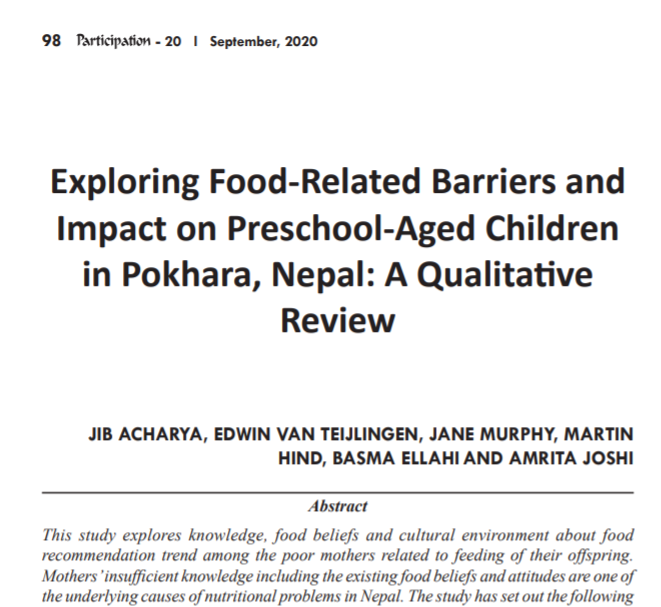
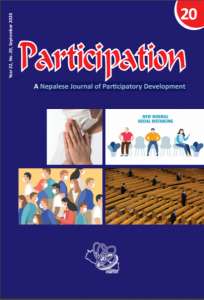
 The procedures for late submissions of external research and knowledge exchange applications has been updated in line with strategic guidance from UET to ensure that quality applications are submitted and adhere to BU’s financial regulations. The updated procedure can be found on the
The procedures for late submissions of external research and knowledge exchange applications has been updated in line with strategic guidance from UET to ensure that quality applications are submitted and adhere to BU’s financial regulations. The updated procedure can be found on the 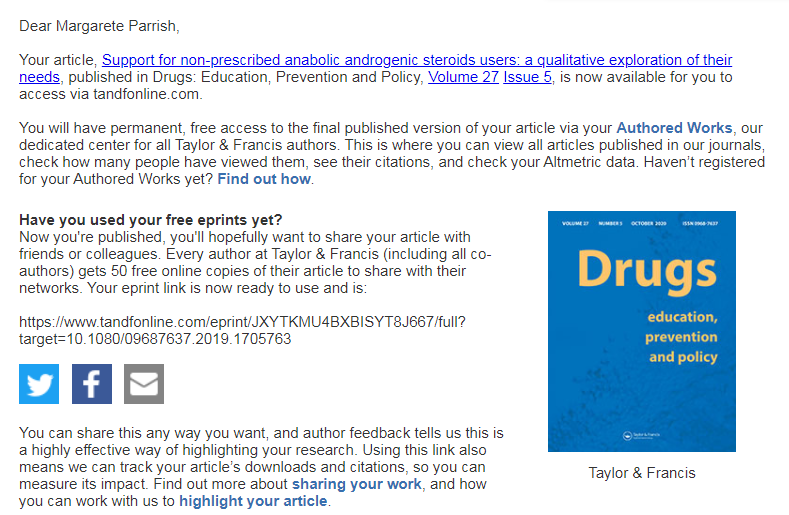


 The
The 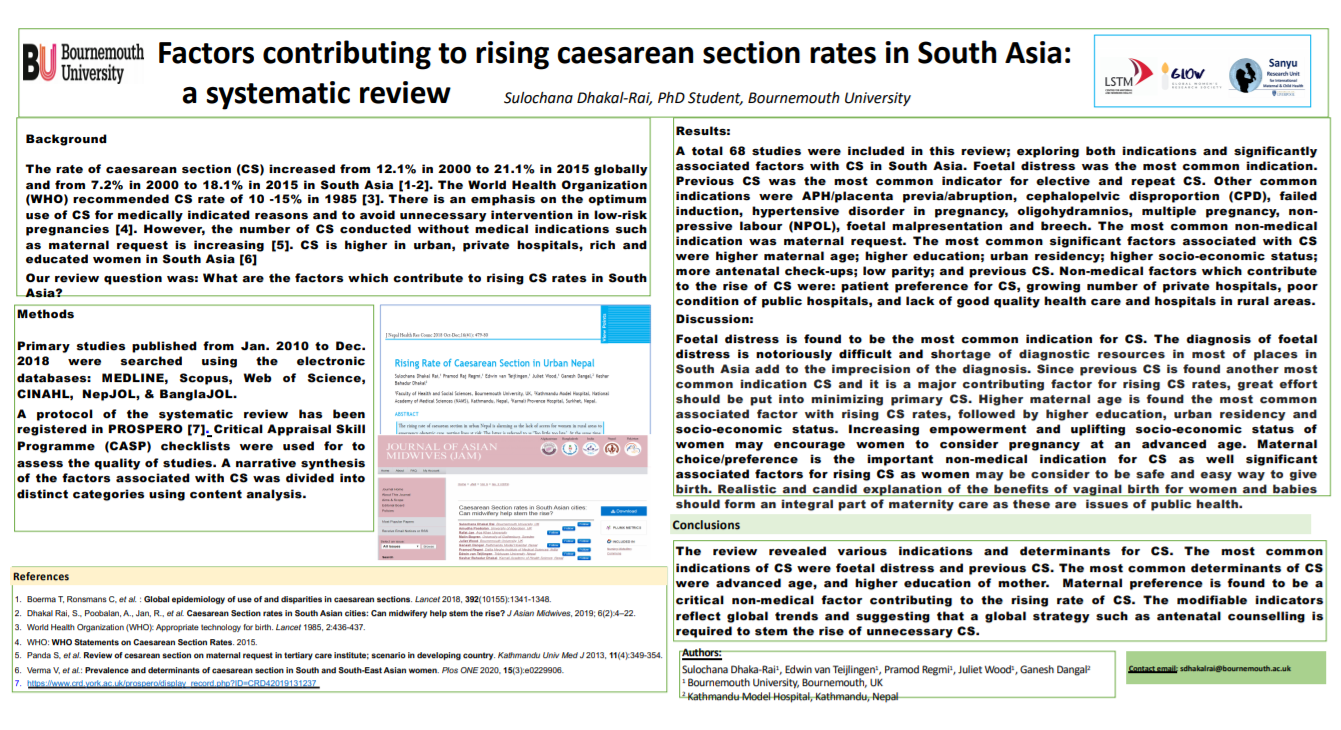
 In summer 2015, we launched the BU Bridging Fund Scheme which aims to provide additional stability to fixed-term researchers who are often employed on short term contacts linked to external funding. This situation may impact on continuity of employment due to breaks in employment, job security and can result in a costly loss of researcher talent for the institution.
In summer 2015, we launched the BU Bridging Fund Scheme which aims to provide additional stability to fixed-term researchers who are often employed on short term contacts linked to external funding. This situation may impact on continuity of employment due to breaks in employment, job security and can result in a costly loss of researcher talent for the institution.
 From 8th September, the Natural Environment Research Council (NERC) are launching a weekly zoom for early career researchers working in the broad field of Paleo sciences.
From 8th September, the Natural Environment Research Council (NERC) are launching a weekly zoom for early career researchers working in the broad field of Paleo sciences.
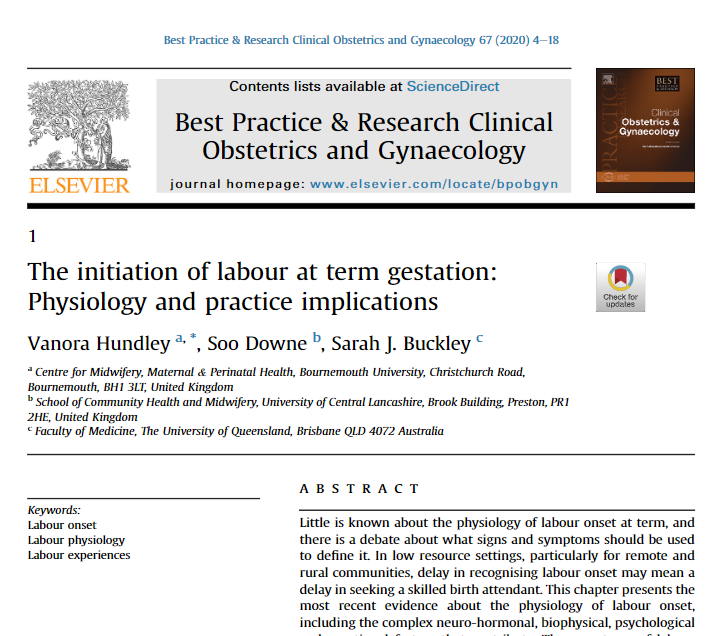

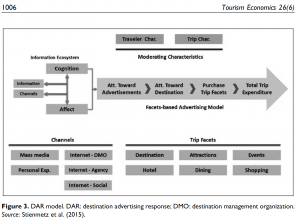











 Upcoming opportunities for PGRs – collaborate externally
Upcoming opportunities for PGRs – collaborate externally BU involved in new MRF dissemination grant
BU involved in new MRF dissemination grant New COVID-19 publication
New COVID-19 publication MSCA Postdoctoral Fellowships 2024
MSCA Postdoctoral Fellowships 2024 Horizon Europe News – December 2023
Horizon Europe News – December 2023